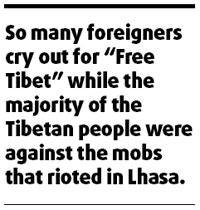True tales they would not hear
By Eirick Granqvist (China Daily)
Updated: 2008-04-15 07:40
Updated: 2008-04-15 07:40

I was very shocked by what I had seen on the television and in China Daily about the riots in Lhasa. The most shocking thing for me was not the cruel events themselves but how the media in my country of origin, Finland, reported the events.
A friend has scanned and sent me articles and I also have checked what can be found on the Internet.
Very few Finnish people have ever visited Tibet, but I traveled there with my wife in 2006. I saw Lhasa with my own eyes, and talked with the local people.
The trip was without any restrictions. Therefore I think I can tell you of the Tibet in my memory.
I am well aware of the possibility that those self-righteous people who haven't been to Tibet will not like to hear the truth.
In the Tang Dynasty (AD 618-907), Tibetans and Han people had been closely linked through royal marriages. Songstan Gambo, the Tubo king, married Tang Princess Wencheng in AD 641.
The Yuan emperor established the Xuanzhengyuan, or Ministry of the Spread of Governance, to directly handle important military and political affairs involving the Tibet region. In the Yuan Dynasty (1271-1368), post stations were linked up in a communication line extending from Tibet up to Dadu (currently Beijing).
The Ming Dynasty (1368-1644) replaced the Yuan Dynasty and inherited the right to rule Tibet.
The Qing Dynasty (1644-1911) strengthened the administration of Tibet. The Qing emperor granted an honorific title to the fifth Dalai Lama and then did the same for the fifth Bainqen Lama in 1713, officially establishing the titles of the Dalai Lama and the Bainqen Erdeni, and their political and religious status in Tibet.
In late Qing Dynasty, Britain, France and other Western nations tried to colonize China under their colonial rule following the Opium Wars in the 1840s.
Meanwhile, some also coveted parts of the country, such as Tibet, the so-called issue of "Tibet independence" is originally an outcome of aggression by imperialist nations.
However, even the current 14th Dalai Lama was officially recognized by then Chinese central government.
Before Tibet's peaceful liberation, about 5 percent of the population owned everything and the rest literally nothing. About 40 percent of the Tibetans were monks and nuns living as parasites on the rest of the population that had to feed them.
In 1924, a French woman, Alexandra David-Nel visited Lhasa dressed as a Tibetan pilgrim. She told how many times she was afraid to be discovered and would be sentenced to death like other opponents. Tibet of the old days was not a paradise.
The reform to end serfdom in 1959 brought fortune to the poor but also the rebellion of the Dalai Lama. Then the Dalai Lama escaped to India with his followers.
It cannot be denied that the ten-year "cultural revolution" (1966-1976) was an unhappy time for the whole of China, but after the grey period Tibetan culture recovered and monks were respected.

Now Lhasa has a modern airport and a railway. The central government has invested a lot in Tibet. The standard of living has been raised a lot in Tibet.
Last Christmas I saw Tibetans spending holidays in Hainan island. The elder women wore traditional dress and the teenagers dressed very casually.
Therefore it is hard to understand what the Dalai Lama wants when he "seek(s) independence for Tibetans". It obviously has nothing to do with the Tibetan people who are enjoying their lives. His intention is only to grab back his own power in Tibet and push Tibetans back to the old days.
Fewer and fewer Tibetans followed the Dalai Lama as his influence waned, turning him to seek support from international forces.
That's why so many foreigners cry out for "Free Tibet" while the majority of the Tibetan people were against the mobs that rioted in Lhasa.
There were no peaceful demonstrations in Lhasa that were "brutally knocked down". Only a handful of young men went on the rampage following well-prepared plans to riot at many places at the same time so that police and fire brigade were taken by surprise and unable to act everywhere at the same time.
This was successful. People were just knocked down at random and all that could be broken was broken in the shortest possible time.
With Molotov cocktails, fires were lit, fire engines were stopped, and 18 innocent citizens and a policeman were killed in cruel ways.
When I saw the filmed riots on television, my diagnosis was immediately clear. The rioters tried to tarnish China's image through their plans.
The Dalai Lama is acting as the friendly and peaceful father. This is an old trick that dictators in history also used.
I am not comparing him with them but he must be in his desperation to take back his power at any cost. His words show no concern for human lives and are against the Buddhist principle of non-violence. And now he is asking for "international help" to stop the violence he had planned and incited.
When I visited Tibet in 2006, I was surprised by the relaxed atmosphere and the few policemen in Lhasa. All that I had seen were Tibetans. The atmosphere was remarkably peaceful and gave a picture of general well-being of the people.
The people in Lhasa were friendly and wanted to speak to me. Unfortunately, I could not speak Mandarin or Tibetan. But some of them spoke to me with a little English. Their wish for contact was just out of normal curiosity about the foreigners.
I felt strange while the Western media reported that Tibet was full of Han people, because most people I saw and met were Tibetans. Were the Han people hiding all the time?
The Western media alleged that China had censored all information about the riots, and e-mails about the incidents could not be sent abroad.
I got mad about all the apparently incorrect information and sent three e-mails smoothly to three Western newspapers to air my opinion.
However, only the third one agreed to publish my article as a short "letter to the editor". Maybe what I wrote was too friendly to China for the "free press" which was hungry only for the Dalai Lama's voices.
The author is a Finn museum expert currently living in China
(China Daily 04/15/2008 page9)
|
||
|
||
|
|
|
|